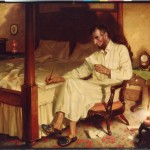 Professor Julie Oseid examines Abraham Lincoln’s writing in her article The Power of Brevity: Adopt Abraham Lincoln’s Habits, 6 J. ALWD 28 (2009). Based on her review of Lincoln’s writing, Oseid recommends that lawyers use his “habits of writing early, visualizing audience, and ruthlessly editing.” (page 29)
Professor Julie Oseid examines Abraham Lincoln’s writing in her article The Power of Brevity: Adopt Abraham Lincoln’s Habits, 6 J. ALWD 28 (2009). Based on her review of Lincoln’s writing, Oseid recommends that lawyers use his “habits of writing early, visualizing audience, and ruthlessly editing.” (page 29)
Oseid starts with the premise that “[t]he goal of brevity should be clarity.” (29) Lincoln, she says, described the opposite of brevity when he said that another lawyer could “’compress the most words into the smallest ideas of any man I ever met.’” (29) Brevity does not sacrifice precision, however, and a writer must be aware of concepts like the rhythm and sound in phrases like “’[f]our score and seven years ago.’” (30)
Brevity has persuasive power. (30) Oseid quotes Justice Antonin Scalia and Bryan A. Garner on brevity in Making Your Case: The Art of Persuading Judges: “’Judges often associate the brevity of the brief with the quality of the lawyer. Many judges we’ve spoken with say that good lawyers often come in far below the page limits—and that bad lawyers almost never do.’” (30)
Lincoln used brevity to persuade as a lawyer. (33) Oseid describes the language Lincoln used with a jury as clear, simple, and non-technical. (35) He used “common language to appeal to the average person.” (35)
Lincoln also used brevity to persuade as president. (36-37) The Gettysburg Address is only 272 words long, and 206 of those words are only one syllable long. (41) Similar to his days as a lawyer, in the Gettysburg Address Lincoln “used ordinary vocabulary to persuade his listening and reading audiences.” (41) Oseid explains that the Gettysburg audience of 15,000 to 20,000 people had been waiting for hours to hear him speak. (48-49) Lincoln’s Second Inaugural is 701 words long; “Lincoln delivered it in about six minutes.” (42) In this speech, Lincoln used brevity of language to distill his message of reconciliation for the war weary audience. (44, 49)
Oseid recommends adopting Lincoln’s writing habits. (45) Lincoln started writing his speeches early and diligently and learned to visualize his audience. (46-48) He emphasized those habits to other lawyers. (47) Lincoln himself said that the way to learn the law is “’very simple, though laborious and tedious. It is only to get the books, and read, and study them carefully. . . . Work, work, work, is the main thing.’” (47) “He knew that diligence in refining his work would pay off with increased persuasiveness.” (47)

Thanks for this post, Melissa. Your observations about brevity in presidential remarks called to mind my favorite presidential anecdote of all time, involving the famously laconic Calvin Coolidge. Once, at a dinner, a woman turned to “Silent Cal” and said, “Mr. Coolidge, I’ve made a bet against a fellow who said it was impossible to get more than two words out of you.” His reply: “You lose.”